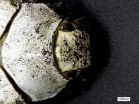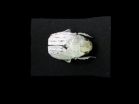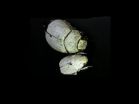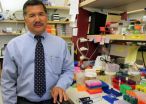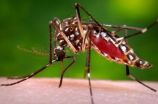(Press-News.org) The physical properties of the ultra-white scales on certain species of beetle could be used to make whiter paper, plastics and paints, while using far less material than is used in current manufacturing methods.
The Cyphochilus beetle, which is native to South-East Asia, is whiter than paper, thanks to ultra-thin scales which cover its body. A new investigation of the optical properties of these scales has shown that they are able to scatter light more efficiently than any other biological tissue known, which is how they are able to achieve such a bright whiteness. The findings are published today (15 August) in the journal Scientific Reports.
Animals produce colours for several purposes, from camouflage to communication, to mating and thermoregulation. Bright colours are usually produced using pigments, which absorb certain wavelengths of light and reflect others, which our eyes then perceive as colour.
To appear as white, however, a tissue needs to reflect all wavelengths of light with the same efficiency. The ultra-white Cyphochilus and L. Stigma beetles produce this colouration by exploiting the geometry of a dense complex network of chitin – a molecule similar in structure to cellulose, which is found throughout nature, including in the shells of molluscs, the exoskeletons of insects and the cell walls of fungi. The chitin filaments are just a few billionths of a metre thick, and on their own are not particularly good at reflecting light.
The research, a collaboration between the University of Cambridge and the European Laboratory for non-Linear Spectroscopy in Italy has shown that the beetles have optimised their internal structure in order to produce maximum white with minimum material, like a painter who needs to whiten a wall with a very small quantity of paint. This efficiency is particularly important for insects that fly, as it makes them lighter.
Over millions of years of evolution the beetles have developed a compressed network of chitin filaments. This network is directionally-dependent, or anisotropic, which allows high intensities of reflected light for all colours at the same time, resulting in a very intense white with very little material.
"Current technology is not able to produce a coating as white as these beetles can in such a thin layer," said Dr Silvia Vignolini of the University's Cavendish Laboratory, who led the research. "In order to survive, these beetles need to optimise their optical response but this comes with the strong constraint of using as little material as possible in order to save energy and to keep the scales light enough in order to fly. Curiously, these beetles succeed in this task using chitin, which has a relatively low refractive index."
Exactly how this could be possible remained unclear up to now. The researchers studied how light propagates in the white scales, quantitatively measuring their scattering strength for the first time and demonstrating that they scatter light more efficiently than any other low-refractive-index material yet known.
"These scales have a structure that is truly complex since it gives rise to something that is more than the sum of its parts," said co-author Dr Matteo Burresi of the Italian National Institute of Optics in Florence. "Our simulations show that a randomly packed collection of its constituent elements by itself is not sufficient to achieve the degree of brightness that we observe."
In recent years, many engineers having been looking to structures found in nature to inspire their designs. "The lessons we are learning from these beetles is two-fold," said Dr Vignolini. "On one hand, we now know how to look to improve scattering strength of a given structure by varying its geometry. On the other hand the use of strongly scattering materials, such as the particles commonly used for white paint, is not mandatory to achieve an ultra-white coating."
These findings will likely be relevant for many applications, enabling objects such as paper, plastics, paints, as well as white-light reflectors inside new-generation displays to be made whiter, while at the same time using a smaller amount of material.
INFORMATION:
The research was funded by the European Research Council and the Biotechnology and Biological Sciences Research Council (BBSRC).
The beetle's white album
Structure of certain types of beetle shells could inspire brighter, whiter coatings and materials
2014-08-15
ELSE PRESS RELEASES FROM THIS DATE:
Personal, public costs of scientific misconduct calculated
2014-08-15
Much has been assumed about the private and public damage of scientific misconduct. Yet few have tried to measure the costs to perpetrators and to society.
A recent study calculated some of the career impacts, as well as federal funding wasted, when biomedical research papers are retracted. The results appear in the Aug. 15 issue of the journal eLife.
In questioning common assumptions, the study authors determined that scientific misconduct typically, but not always, exacts a personal toll in derailing careers. On the public side, the cost to federal funding sources ...
Previous pulmonary disease linked to increased lung cancer risk in large study
2014-08-15
Links between a number of common respiratory diseases and an increased risk of developing lung cancer have been found in a large pooled analysis of seven studies involving more than 25,000 individuals.
"Associations between various respiratory diseases and lung cancer have been shown in earlier studies, but few of these studies considered multiple respiratory diseases simultaneously," said researcher Ann Olsson, PhD, of the International Agency for Research in Cancer in Lyon, France. "In our pooled analysis of seven case-control studies involving more than 12,500 cases ...
Human milk fat improves growth in premature infants
2014-08-15
HOUSTON – (August 15, 2014) – For premature infants, adequate growth while in the neonatal intensive care unit is an indicator of better long-term health and developmental outcomes. Researchers at the USDA/ARS Children's Nutrition Research Center at Baylor College of Medicine and Texas Children's Hospital have now successfully incorporated a cream supplement into premature infants' diets that improved their growth outcomes in the NICU. The report appears today in the Journal of Pediatrics.
"For premature babies who weigh less than 1,000 grams (about 2 pounds, 2 ounces), ...
Woodrats' genes help them to win the arms race against their food
2014-08-15
A handful of genes arm the woodrat against the toxic chemicals in its foodstuff, the creosote plant, according to research published in the open access journal BMC Ecology.
It's long been a mystery exactly how the woodrat developed the ability to handle the chemicals in the creosote plant, which are toxic to other rodents. Previous research has suggested that they are protected by factors such as gut bacteria. But the new study identifies the genes switched on in two species of woodrat with resistance to the plant poisons, showing that the genes that they are born with ...
Experimental chikungunya vaccine induces robust antibody response
2014-08-15
An experimental vaccine to prevent the mosquito-borne viral illness chikungunya elicited neutralizing antibodies in all 25 adult volunteers who participated in a recent early-stage clinical trial conducted by researchers at the National Institute of Allergy and Infectious Diseases (NIAID), part of the National Institutes of Health. The results are reported in the current issue of The Lancet.
The most distinctive symptom of chikungunya infection is severe joint pain accompanied by headache and fever. There are currently no vaccines or specific drug treatments for chikungunya. ...
The Lancet: European Society of Cardiology Congress media alert
2014-08-15
The Lancet is pleased to announce that the following papers will be published ahead of the European Society of Cardiology Congress 2014, taking place in Barcelona, Spain, from 30 August to 3 September 2014. This includes a special Series of three papers on lipids and cardiovascular disease.
Blood pressure-lowering treatment based on cardiovascular risk: a meta-analysis of individual patient data by Dr Johan Sundström et al
This study investigated whether the success of blood pressure-lowering drugs is dependent on baseline cardiovascular risk, and whether this could ...
The Lancet: virus-like particle vaccine shows promise against chikungunya
2014-08-15
The first human trial of a new vaccine developed using non-infectious virus-like particles (VLP) appears likely to offer protection against chikungunya virus, a mosquito-borne infection, according to a study published in The Lancet. Since its re-emergence in 2004, chikungunya virus has become a growing public-health threat that has affected millions of people in Africa, Asia, and Europe, and in recent months it has been spreading throughout the Americas.
"Chikungunya virus has adapted itself to be transmitted by not only the Aedes aegypti mosquito that lives mainly in ...
Gender disparities uncovered in desire to receive living donor kidney transplants
2014-08-15
Washington, DC (August 14, 2014) — Among black kidney failure patients undergoing dialysis, women are much less likely than men to want to receive kidney transplants from living donors, despite more offers from family and friends. The findings, which are from a study appearing in an upcoming issue of the Clinical Journal of the American Society of Nephrology (CJASN), suggest that interventions are needed to increase women's acceptance of living donor kidney transplantation.
Living donor kidney transplantation is the treatment of choice for patients with kidney failure, ...
Make your mobile device live up to its true potential -- as a data collection tool
2014-08-15
Leaf measurements are often critical in plant physiological and ecological studies, but traditional methods have been time consuming and sometimes destructive to plant samples. Researchers at the University of California, Davis, have developed Easy Leaf Area—a free software written in an open-source programming language—to allow users to accurately measure leaf area from digital images in seconds.
"It has always been a challenge to measure leaf surface area without damaging the plants or spending long hours in the lab, so I decided to attempt to write software to automatically ...
Low education, smoking, high blood pressure may lead to increased stroke risk
2014-08-14
Adults smokers with limited education face a greater risk of stroke than those with a higher education, according to new research in the American Heart Association's journal Stroke.
The combination of smoking and high blood pressure increased stroke risk the most, confirming earlier findings in numerous studies.
In a multicenter Danish study, researchers defined lower education as grade school or lower secondary school (maximum of 10 years) education.
"We found it is worse being a current smoker with lower education than a current smoker with a higher education," said ...
LAST 30 PRESS RELEASES:
Alkali cation effects in electrochemical carbon dioxide reduction
Test platforms for charging wireless cars now fit on a bench
$3 million NIH grant funds national study of Medicare Advantage’s benefit expansion into social supports
Amplified Sciences achieves CAP accreditation for cutting-edge diagnostic lab
Fred Hutch announces 12 recipients of the annual Harold M. Weintraub Graduate Student Award
Native forest litter helps rebuild soil life in post-mining landscapes
Mountain soils in arid regions may emit more greenhouse gas as climate shifts, new study finds
Pairing biochar with other soil amendments could unlock stronger gains in soil health
Why do we get a skip in our step when we’re happy? Thank dopamine
UC Irvine scientists uncover cellular mechanism behind muscle repair
Platform to map living brain noninvasively takes next big step
Stress-testing the Cascadia Subduction Zone reveals variability that could impact how earthquakes spread
We may be underestimating the true carbon cost of northern wildfires
Blood test predicts which bladder cancer patients may safely skip surgery
Kennesaw State's Vijay Anand honored as National Academy of Inventors Senior Member
Recovery from whaling reveals the role of age in Humpback reproduction
Can the canny tick help prevent disease like MS and cancer?
Newcomer children show lower rates of emergency department use for non‑urgent conditions, study finds
Cognitive and neuropsychiatric function in former American football players
From trash to climate tech: rubber gloves find new life as carbon capturers materials
A step towards needed treatments for hantaviruses in new molecular map
Boys are more motivated, while girls are more compassionate?
Study identifies opposing roles for IL6 and IL6R in long-term mortality
AI accurately spots medical disorder from privacy-conscious hand images
Transient Pauli blocking for broadband ultrafast optical switching
Political polarization can spur CO2 emissions, stymie climate action
Researchers develop new strategy for improving inverted perovskite solar cells
Yes! The role of YAP and CTGF as potential therapeutic targets for preventing severe liver disease
Pancreatic cancer may begin hiding from the immune system earlier than we thought
Robotic wing inspired by nature delivers leap in underwater stability
[Press-News.org] The beetle's white albumStructure of certain types of beetle shells could inspire brighter, whiter coatings and materials
